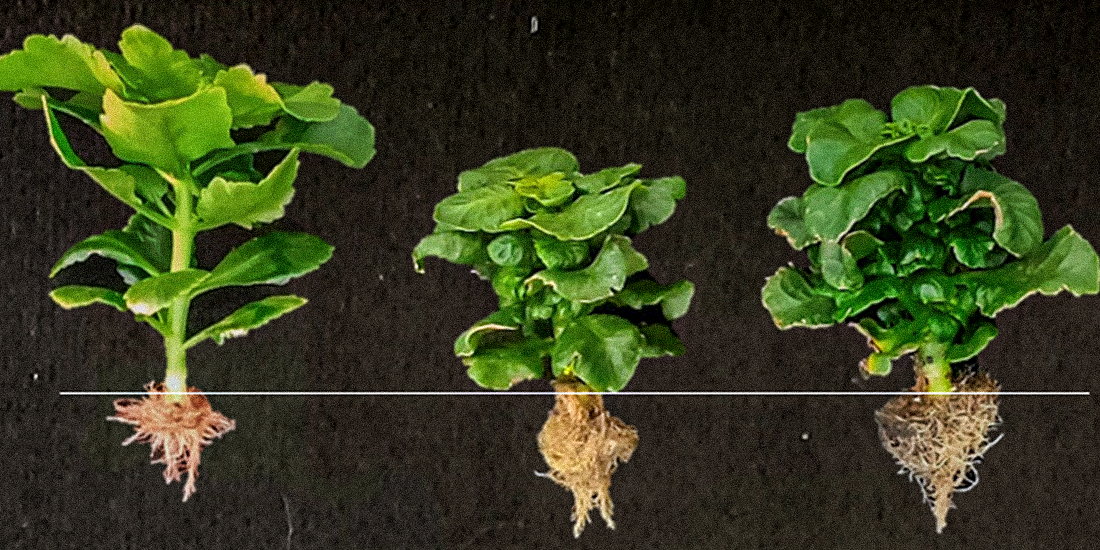Horticultural Science and Biotechnology

The research group has focus on high quality plants and plant products, fruit and berry physiology, quality improvement, postharvest and ethylene biology. Additionally, we integrate processing and wine production, and emerging technologies for organic fruit production. The genetic structure and new techniques of modern gene bank management are studied and implemented (The apple key, cryo preservation, virus elimination and cultivar identification/genotyping).
Our research addresses both classical breeding and molecular crop improvement including genetic engineering. We have developed a platform for natural transformation of plants using Rhizobium rhizogenes as a non-GMO technology. This has been widely used in generating compact ornamental potted plants as alternative to application of hazardous chemical growth retardants. We now also apply this method for production of high value plant compounds via hairy roots and for studying potential root system architecture (RSA) improvements in respect to drought on regenerated plants. Moreover, a basic science background has been and is currently explored transforming Arabidopsis and Kalanchoë with selected individual root oncogenic loci (rol) and/or open reading frames (ORFs) from R. rhizogenes. These studies focus on deciphering the pleiotropic effects of individual constructs derived from this bacterium on plant morphology, i.e. compactness and RSA.
We use molecular techniques to understand basic plant processes, regulation of plant secondary metabolism or elucidation of hormonal regulation and signalling pathways in plants.
- Rhizobium rhizogenes-mediated transformation of plants
- Fruit and berry physiology and quality improvement
- High value compounds in plants
- Plant transformation and regeneration
- Plant tissue culture
- Cool climate viticulture and enology
- Ethylene biology and postharvest physiology
- Genetic resources
Experimental Plant Science (LPLK10392U): 43%
Cool Climate Viticulture and Enology (NPLK20001U) 48%
Botanik (Botany) (NPLB14017U): 27%
Fruit and Berry Crop Physiology and Quality (NPLK14014U): 83%
Tema Plantevidenskab (LPLB10328U): 10%
- Developed a non-GMO transformation platform based on Rhizobium rhizogenes for generation of hairy cultures for production of valuable bioactive compounds
- Established a plant regeneration platform for hairy roots derived from transformation with Rhizobium rhizogenes serving as a method for producing compact ornamental plants as alternative to hazardous growth retardants.
- Novel avenues on root system architecture improvement upon the presence of Rhizobium rhizogenes T-DNA.
- Characterization of the enological potential in the new disease tolerant cv Solaris in Danish conditions.
- Introduction of dormant bud cryopreservation of apples in the mild maritime climate.
- Exploitation of the genetic structure in the Danish national gene bank collection of apples through genotyping-by-sequencing.
Favero BT, Tan Y, Lin Y, Hansen HB, Shadmani N, Xu J, He J, Müller R, Almeida A, Lütken H (2021): Transgenic Kalanchoë blossfeldiana, containing individual rol genes and ORFs under 35S promoter, exhibit compact habit, reduced plant growth, and altered ethylene tolerance in flowers. Front. Plant Sci. 12.
Akhtar SS, Buchvaldt AD, Hegelund JN, Fimognari L, Grosskinsky DK, Westergaard JC, Müller R, Mølbak L, Liu F, Roitsch TG (2020): Bacillus licheniformis FMCH1001increases water use efficiency via growth stimulation in both normal and drought conditions. Front. Plant Sci. 11.
Desmet S, Chooghe E, De Keyser E, Van Huylenbroeck J, Müller R, Geelen D, Lütken H. (2020): Rhizogenic agrobacteria as an innovative tool for plant breeding: current achievements and limitations Applied Microbiology and Biotechnology 104: 2435-2451.
Dzhanafezova T, Barba-Espin G, Müller R, Joernsgaard B, Hegelund JN, Madsen B, Vega MM, Toldam-Andersen T (2020): Food Bioscience 36: 100620.
Barba-Espín G, Chen S-T, Agnolet S, Hegelund JN, Stanstrup J, Christensen JH, Müller RM, Lütken H. (2020): Ethephon-induced changes in antioxidants and phenolic compounds in anthocyanin-producing black carrot hairy root cultures. J. Exp. Bot.71; 7030-7045.
Kodahl N, Müller R, Lütken H (2016): The Agrobacterium rhizogenes Oncogenes rolB and ORF13 increase Formation of Generative Shoots and induce Dwarfism in Arabidopsis thaliana (L.) Heynh. Plant Science 252: 22-29.
Larsen B, Gardner K, Pedersen C, Ørgaard M, Migicovsky Z, Myles S and Toldam-Andersen TB (2018). Population structure, relatedness and ploidy levels in an apple gene bank revealed through genotyping-by-sequencing. PLoS ONE 13(8): e0201889.
Zhang S, Petersen MA, Liu J and Toldam-Andersen TB (2015). Influence of Pre-Fermentation Treatments on Wine Volatile and Sensory Profile of the New Disease Tolerant Cultivar Solaris. Molecules, 20, 21609–21625; doi:10.3390/molecules201219791
Lütken H, Clarke JL, Müller R (2012): Genetic engineering and sustainable prodution of ornamentals: current status and future directions. Plant Cell Reports; 31: 1141-1157.
Toldam-Andersen TB, Nygaard TB and Suszkiewicz K (2007). Cryopreservation of dormant buds of apple cultivars in a mild maritime winter climate. Adv. Hort. Sci. Vol. 21, No. 4, SPECIAL ISSUE ON TECHNOLOGY, APPLICATION AND VALIDATION OF PLANT CRYOPRESERVATION, pp. 193-197
Sveriges Radio P1: Henrik Lütken, interview by Gustav Klarin: Blommande träd och genförändrade krukväxter (“Flowering trees and genetically modified potted plants”). 27. May 2013. 10.35 am. https://sverigesradio.se/avsnitt/198351
2020-2023: DFF-FTP Research Project 2. An interdisciplinary approach for the sustainable and economical production of taxol, 6.192.000 dkk. Henrik Lütken Co-Pi, main applicant Sotirios Kampranis.
2021-2024: Innovation Fund Denmark Innovation Fund Denmark, Industrial PhD. Canna-Improve: Yield improvements of Cannabis sativa L. by morphological optimization and mineral nutrition, 1.072.000 dkk. Henrik Lütken and Kristian Holst Laursen: Pi’s.
2021-2024: Resilient organic berry cropping systems through enhanced biodiversity and innovative management strategies (ResBerry). 200.000 euro. Torben Bo Toldam-Andersen and Lene Sigsgaard.
2019-2021: Sprint Program The underlying mechanism of abiotic stress tolerance facilitated by the rol-genes (THrUSTER), 75.000 dkk. Henrik Lütken and Bruno Trevenzoli Favero.
2017-2019: DFF-Research Project 1, Aspect. Agrobacterium rhizogenes ORFs 11-15 SPEcific roles in Compact plant Traits: a phenotypic to transcriptomic approach, 2.543.040 dkk. Henrik Lütken: Pi, Bruno Trevenzoli Favero: co-applicant.
Departmental:
Prof. Sotirios Kampranis, Assoc. Prof. Fernando Geu Flores, Assist. Prof Irini Pateraki: hairy roots in Taxus and paclitaxel elucidation
Prof. Søren Bak: hairy roots in Cucumis sativa as a platform to the cucurbitacin production and optimization.
Assoc. Prof. Rosa Lopez: hairy roots in quinoa
Assoc, Prof. Lene Sigsgaard. Organic growing of berries
Assoc. Prof. Carsten Pedersen. DNA studies in apples.
University of Copenhagen:
Assoc. Prof. Mikael Agerlin Pedersen, Department of FOOD. Aroma in fruit and berries, juice and wine
Assoc. Prof. Nils Arneborg, Department of FOOD. Yeast and fermentations of wine and fruit wine.
Prof. Søren Balling Engelsen, Assoc. Prof. Viola Aru, Department of FOOD. NMR, FT-NIR analysis and chemometrics
International:
Sen. Res. Ellen De Keyser, Sen. Res. Emmy Dhooghe, Sci. Dir. Johan Van Huylenbroeck, ILVO, Belgium: rol transformation of plants and molecular characterization.
Prof. Traud Winkelmann, Leibniz University Hannover, Germany: ornamental plant quality.
Prof. Ivan de Godoy Maia, Botucatu, Brazil: rol genes and reactive oxygen species production and accumulation, potential links to mitocondrial transporters.
Assist. Prof. Almecina Balbino, Rio Branco, Brazil: native amazonian species for ornamental uses, novel food and traditional medicinal purposes with views to R. rhizogenes-mediated transformation. Memorandum of understanding for research exchange and joint projects.
Prof. Annette Reineke, Geisenheim University, Germany. Crop protection and biodiversity in berry growing.
All members of the group have already assigned duties/responsibilities at the section/department level. Renate is the section leader for Crop Sciences and Henrik is safety responsible for this section. Henrik is study leader for the MSc education Biotechnology. Henrik is coordinator for the sections lab unit. Torben is the Danish representative in the Fruit and berry working group at NordGen and represents Denmark (and Pometet) in the three ECPGR working groups on Malus/Pyrus, Prunus and Berries.
Group members
| Navn | Titel | Telefon | |
|---|---|---|---|
| Bruno Trevenzoli Favero | Adjunkt | ||
| Henrik Vlk Lütken | Lektor | +4535332006 | |
| Maren Korsgaard | Akademisk medarbejder FU | +4535333401 | |
| Torben Bo Toldam-Andersen | Lektor | +4535333411 |

